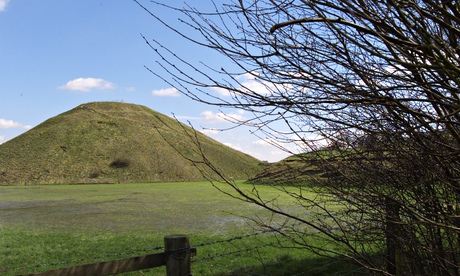
This is a beautiful book. I don't mean the text; we'll come back to that. I mean the book itself, which is the work of Little Toller, a Dorset publisher that specialises in nature writing. On Silbury Hill is the second volume in its new series of monographs – the first was Herbaceous, a series of botanical prose poems by Paul Evans – and in the hand it feels just right: not too big, not too small. On the jacket is a wonderfully atmospheric detail from a painting by David Inshaw: the ancient mound of the title, purplish against the olive green and grey of the Wiltshire fields. Inside, photographs and prints of varying shapes and sizes punctuate the text, giving it the intimate feel of a private album or scrapbook. It has been put together with love, and it shows. In a bookshop, placed centre stage, some will find it hard to resist.
About its contents, however, I feel rather less swoony. Adam Thorpe, one of the most disgracefully underrated novelists we have, is a writer I adore. But I can't seem to find him in this extended essay. Where has he gone? Have the ley lines done something to his brain? I can't work out what On Silbury Hill is supposed to be doing. Is this nature writing, a memoir, or a book about archaeology? Of course, it might easily be all three; such hybrids are hardly out of the ordinary in the age of Robert Macfarlane. Thorpe, though, seems unable to synthesise his ideas – not with much elegance, anyway – and jumps confusingly from an account of what he loves about landscape ("the intimacy of a single cornflower that no one else would ever notice") to his fairly dull childhood memories (he spent some school holidays in Cameroon, where his father was posted by Pan Am) to more esoteric territory (for instance, the work of Alexander Thom, a professor of engineering science who came up with the now disproved concept of the megalithic yard) without ever properly explaining the link between them (assuming there is one). His material cries out for some sense of structure and purpose.
And then there is On Silbury Hill's earnest hippy sensibility. "I have always been susceptible to the tofu-knitting, yoghurt-weaving world," writes Thorpe, and so it proves. It's impossible to take seriously a narrative that includes both a teenage fantasy in which he imagined he was a Neolithic man returning from a hunting trip in the forest ("my woman running out to greet me with her lovely ripe smell of unwashed flesh") and an irony-free description of his adventures in hypnosis ("walking through 18th-century London as a rogue called Ralph Baker, I used period slang and had to research the meanings afterwards"). A climactic scene involves him hanging with a couple of Wiccan Buddhists, Robin and Kim, who "drum him out" of Swallowhead, site of a sacred spring close to Silbury. Be warned: you'll find no sniggering in the undergrowth here, nor even a raised eyebrow. "This, I think, is genuine caring," he writes, touched by the way they continue beating their rhythm until he is but a speck in the gloaming.
Thorpe's connection to Silbury, the largest prehistoric manmade mound in Europe, goes back to childhood, when he was a boarder at nearby Marlborough college. He was not happy there: among many other things, he used to have to wash the Lynyrd Skynyrd mane of a sadistic sixth-former in his senior house. No wonder, then, that he took solace in Silbury and its associated sites. Gazing on the neglected East Kennet Long Barrow at the age of 15, he had a sudden sense that: "I was a mere blip, soon to be extinguished, in comparison with the multiple generations witnessed by this earthwork, and those stretching out into the future." He felt this as a "chill fact", but it must also have been oddly consoling, another term ahead and his parents so far away – and it's this mood that infuses the better parts of the book. Thorpe, thank goodness, has no strong feeling about why Silbury was built (its layers of chalk have been excavated repeatedly down the centuries, but still its purpose eludes us). Whatever else it is, On Silbury Hill is no manifesto. No, for Thorpe, the mound's interest has to do with connection, man-to-man. In a museum in the South Tyrol he looks at the mummified corpse of a man who died of an arrow injury 700 years before Silbury was even begun, and is moved almost to tears by the sight of the knots the man has tied. "These were his knots," he writes. "They show his thought, his care, his imagination." I loved this moment. Suddenly the text seemed to spark to life. But it was just that – a moment – and there is no getting away from the fact that for it to happen, Thorpe had to stand before a glass cabinet in a foreign country, his beloved Wiltshire out of sight, if not quite out of mind.

